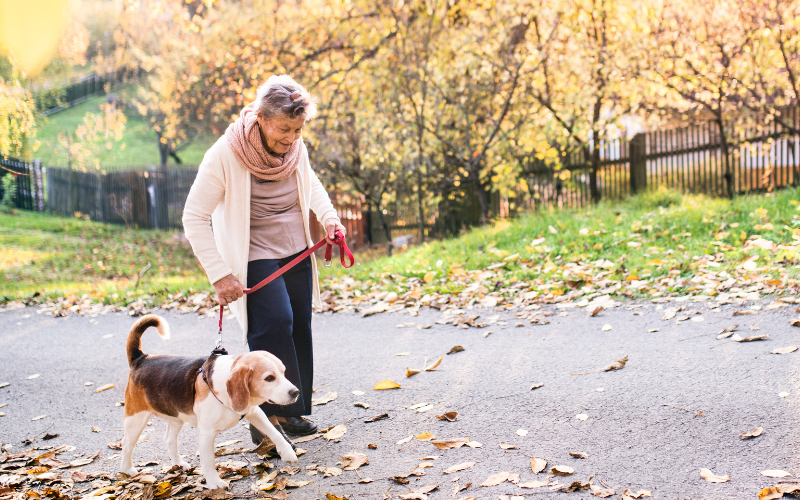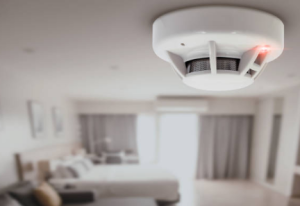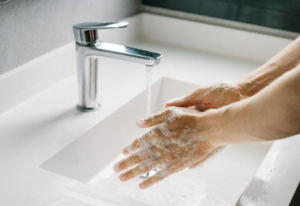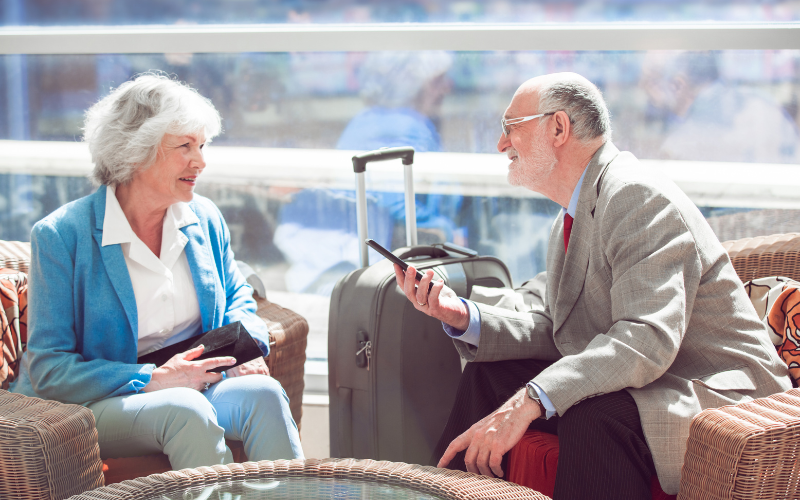Summer is drawing to a close as signs of fall begin to appear. The weather is cooling, and the sun is setting earlier, which are precursors to the cooler temperatures and changing leaves that are sure to come in the next several weeks.

The change in seasons also brings a set of risks and concerns for the health and well-being of seniors. Seniors are at higher risk of getting sick this time of year as the fall coincides with cold and flu season, and the wet, slippery conditions caused by rain and fallen leaves can make the sidewalks a bit more dangerous. It is important for seniors and their families to be aware of these risks so they can take the right steps to prepare and ensure a safe, enjoyable fall season.
The following are tips to help your senior loved ones prepare for the fall.
1. Rake the leaves
Crimson autumn leaves are a breathtaking sight. The leaves change color because of the amount of daylight and photosynthesis, and not the cooler temperatures. Despite their beauty, fallen leaves are hazardous for seniors. You can prevent accidental falls by raking up leaves on the driveway and yard.
Give the roads, sidewalks, and walkways ample attention, taking care to remove all fallen debris. If the senior’s home has exterior stairs, strongly consider installing handrails on both sides. Also place a non-skid surface in this area to prevent slipping and falling on the damp leaves.
 2. Drive with Caution
2. Drive with Caution
Daylight Savings Time ends in early autumn, leading to fewer daylight hours. As darkness descends sooner, elderly drivers should take extra precautions. Due to seniors’ poor eyesight, driving in the dark can be hazardous. If driving is necessary, consider contacting a home care agency to hire a professional caregiver for transportation.
3. Maintain the Vehicle
Prevent the likelihood of a car accident or an untimely breakdown in adverse weather by scheduling a tune up of the senior’s car. Correct air pressure in tires. Headlights, taillights, and signals should work properly. Make sure the heat in the car works, so senior drivers stay warm.
4. Get a Flu Shot
Getting a flu vaccine for the flu season is especially critical for people ages 65 and older. Even though aging immune systems tend to respond poorly to vaccinations, flu vaccinations reduce the number of flu-related hospitalizations.
People over 65 have two flu vaccine options. The first, a high dose flu vaccine, is associated with a higher immune response. The second, the adjuvanted flu vaccine, also promotes a stronger immune response to vaccination. For seniors, either option is advised instead of the regular flu shot.
5. Reduce the Risk of the Flu
In addition to getting the flu shot, seniors should take additional steps to avoid getting sick. Doing the following will help keep your loved ones safe from the flu:
- Avoid contact with those with the flu
- Frequently wash hands with warm water and soap and use alcohol-based hand sanitizer
- Disinfect surfaces throughout the home that may be contaminated
- Exercise regularly to help improve the immune system, with approval from a doctor
6. Get Good Sleep and Exercise Regularly
Regular exercise during the fall helps keep seniors in good physical shape and prevent illness by boosting the immune system. Seniors should find exercises they enjoy that are also within their ability such as yoga or taking walks, and they can go to a community or senior center and participate in exercises designed for older adults. Exercising regularly will help seniors get better sleep, improve their balance, prevent falls, gain strength, and recover faster if they are injured.
7. Add Artificial Light
With the days growing darker in the autumn months, seniors will rely more on artificial light inside the home. Anticipate the need for extra lightbulbs, batteries, and candles. If using candles, advise the senior to never leave them unattended and to always be present when they burn.
Consider installing smart lights in the senior’s home; these lights turn on automatically upon sensing motion. Plug in nightlights in the hallways to the bathroom to assist during emergency trips. Keep in mind that inadequate lighting is a major contributor to senior falls.
 8. Test Smoke Detectors
8. Test Smoke Detectors
While candles burn, they emit smoke. Stay on top of fire safety by checking the batteries in the smoke detectors in the senior’s home. A good reminder is to check the smoke detectors when daylight savings time starts in March and ends in November. At the same time, check the functionality of carbon monoxide detectors.
9. Wear Warm Clothes
When the weather outside is chilly, people reach for cozy hats, mittens, and coats. But a senior with dementia may fail to realize the dangers of frigid weather. Prepare ahead for the cold weather by ensuring your elderly loved one has easy access to warm weather clothing.
Just as warm clothes are necessary for the autumn months, waterproof, non-slip shoes are too. Wet, slippery leaves and icy rain are pathways to outdoor falls. Prevent a fall by encouraging the senior to wear slip-resistant outdoor shoes when heading out of the house.
Inside the home, non-skid shoes are ideal. Remember that the moisture from rain can be tracked indoors, leading to small puddles and slippery floors. The combination of water, poor lighting, and clutter in the halls can result in a fall. Prepare the senior by having her wear non-skid shoes inside.
10. Inspect the Heater
Fall weather can drop to uncomfortably cold temperatures, especially at night. Families should ensure the senior’s heater works by scheduling heating maintenance well before the cool season. Schedule a chimney inspection and cleaning of the fireplace to prevent a flue fire.
11. Adjust Thermostat
Fall is also a good time to adjust the thermostat. Even better, consider installing a smart thermostat in the senior’s home. Some smart thermostats are designed specifically for seniors and include large icons for increased visibility, ease of use, and improved control for those with limited motor skills.
 12. Wash Hands
12. Wash Hands
Seasonal illnesses may be warded off with frequent hand washing. Encourage seniors to regularly wash their hands with soap and water for at least 20 seconds. The coronavirus, too, is disabled with handwashing with soap and water or using an alcohol-based hand sanitizer.
13. Exercise, Eat and Sleep
Exercise, like yoga or walking, can help decrease a senior’s chances of becoming sick during the autumn season. Physical activity also promotes strong muscles and healthy joints, which can reduce fall risks. A good night’s rest helps to keep a senior’s immune system healthy.
Nourishment is essential. A senior loved one should partake in the autumnal season’s bounties, like sweet potato, broccoli, pumpkin, and cranberries, to promote heart health and boost the immune system. If the senior is unable to cook, a professional caregiver will prepare nutrient-rich dishes.
Senior Companion Care from Assisting Hands
Your senior loved ones deserve compassionate and skilled care, especially as the seasons change. At Assisting Hands Home Care, we offer comprehensive support for the elderly with activities of daily living (ADLs) such as bathing, dressing, and personal hygiene as well as help around the home with meal preparation, fall prevention, and transportation.
Our dedicated professionals deliver non-medical home care within the comforting environment of the senior’s home. Our elder care services enable seniors to age in place with dignity. Whether your loved one needs dementia care, companion care, live-in care, or home hospice care, we tailor an effective care plan to meet their specific needs.
When you are preparing your loved one for the fall season or any other time of year, call Assisting Hands Home Care at (630) 634-9316. Our professional caregivers devote time and attention to promoting the well-being of the elderly in our care. We support seniors living in Glen Ellyn, IL | Warrenville, IL | Naperville, IL | Westmont, IL | Woodridge, IL | Lisle, IL | Wheaton, IL and the surrounding communities.















